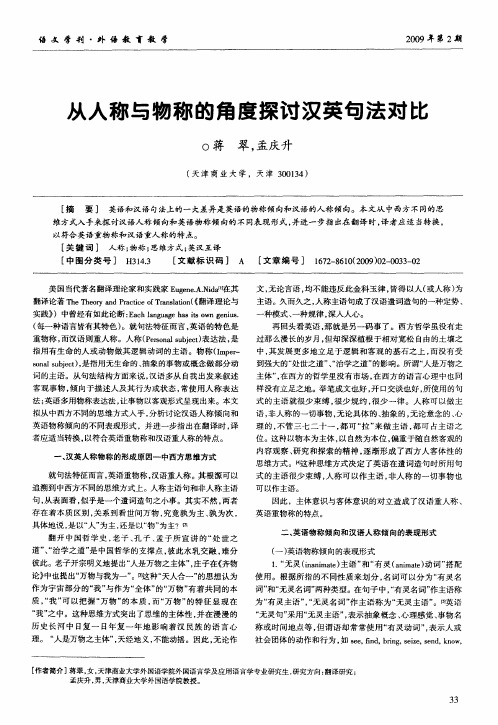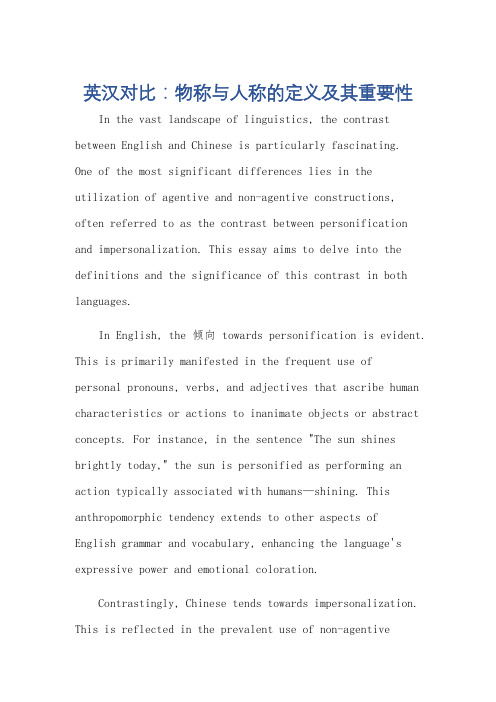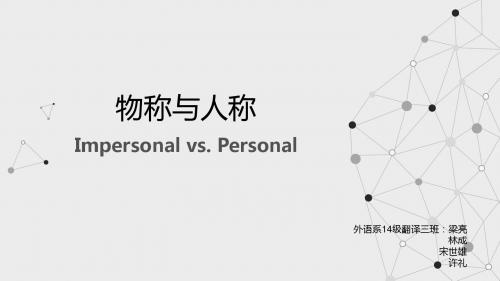英汉物称与人称对比分析
从人称与物称的角度探讨汉英句法对比

[ 文献标 识码 】 A [ 文章 编号 ] 17— 60 20 )20 3— 2 62 81(09 0— 03 0
文, 无论言语 , 均不能违反此金科玉律 , 皆得以人( 或人称 ) 为 主语。久而久之 , 人称主语 句成 了汉语遣词造句的一种定势 、
一
美国当代著名翻译 理论家和实践家 E gn ..iar ue e Nd n A  ̄其 翻译论著 T eT er adPateo rnltn 《 h o n r i f as i ( 翻译 理论与 h y cc T ao 实践》 )中曾经有如此论 断 :ahl gaehs to ngnu. E c ug a s w eis n a i
翻 开 中 国 哲 学 史 , 子 、 L 、 子 所 宣 讲 的 “ 世 之 老 孑子 孟 处
式 的主语很少束缚 , 人称可 以作 主语 , 非人称 的一切事物也
可 以作 主语 。
因此 ,主体 意识与客体意识 的对立 造成 了汉语重人称 、 英语重物称 的特点。
二 、 语 物 称 倾 向和 汉 语 人 称 倾 向的 表现 形 式 英
语 文 学 刊 ・外 话 教 育 教 学
20 0 9年 第 2期
从 人称 与 物称 的 角 度探讨 汉 英 句 法对 比
。蒋 翠, 孟庆 升
( 津 商 业 大 学 ,天 津 303 ) 天 0 14
[ 摘 要 ] 英语和汉语句法上的一大差异是英语的物称倾 向和汉语的人称倾向。本文从中西方不同的思
道 ”“ 、治学 之道 ” 中国哲学 的支撑点 , 是 彼此 水乳交融 , 难分
彼此 。老子开宗明义地提 出“ 人是万物之主体”庄子在《 , 齐物
( ) 一 英语物称倾 向的表现形 式 1“ . 无灵 ( ai t) i nma 主语 ” 有灵 (nm t) 词” 配 n e 和“ ai a 动 e 搭
lecture 11(物称与人称)

the conference room at 2 P· Friday. M. (All faculty and staff are requested to meet in the conference room at 2 P· Friday.) M.
三、物称与人称的翻译策略 (一)有灵主语与无灵主语的转换 汉语句子多为有灵主语;而英语善用无灵主语。 在翻译中,为了符合英汉各自的思维方式,在叙述 方式上必须注意主语的转换。请看下例英汉互译 中的转换: (12)Business took him to the town. 他因事进城去了。 (13)A great elation overcame them. 他们欣喜若狂。
她独处时便感到一种特殊的安宁。
2.非人称代词“it”和there be句型的使用。
王力先生曾对英语形式主语做过精辟的论述:就 句子结构而言,西洋语言(英语)是法治的,中国语 言是人治的,法治的不管主语用得着用不着,总要 呆板地求句子形式的一律;人治的用得着就用,用 不着的就不用,只要能使对话人听懂说话人的意 思,就算了。这也为英汉互译中“it”形式主语和 零位主语的处理提供了依据。
与此形成对比的是,中国人相信“天人合一 (oneness between man and nature)”。 而且, 这种“天人合一”儒家的代表人物孟子认为“万 物皆备于我” 。因此,从“我”就可以掌握“万 物”的本质,而“万物”的特征也显现在“我” 之中。这即是中国文化传统意义上的人本文化。 这种人本文化的长期积淀,形成了汉民族主体型 的思维方式,即以人文为中心来观察、分析、推 理和研究事物的思维
(英文中出现了七个动词被动式,而中文里却 一个“被”字也没有,翻译时还添加了多个“我 们”“你们”等人称词。英汉语民族思维习惯之
简论英语的物称倾向与汉语的称倾向

简论英语物称倾向与汉语人称倾向外国语学院 2010级英语5班刘**摘要:英语和汉语句法上的一大差异是英语的物称倾向和汉语的人称倾向。
本文拟从中西民族的认知思维方式上分析此差异的成因,和简论英语物称倾向和汉语人称倾向的不同表现形式,并进一步指出在翻译中,译者应适当转换,以符合英汉语分别重物称和人称的特点。
关键词:物称;人称;差异;翻译策略On the Impersonal Orientation of English and the PersonalOrientation of ChineseAbstract:One of the differences of sentence patterns between English and Chinese is the impersonal orientation in English and the personal orientation in Chinese. This paper analyses the differences from the different cognitive modes of thinking between Chinese and Western nations and the different manifestations between English impersonal orientation and Chinese personal orientation. It also points out that grammaticality must be taken into reasonable consideration in both English-Chinese and Chinese-English translation.Key words:Impersonal subject; Personal subject; differences;translation techniques一、引言“英语较多用物称表达法,让事物以客观的形式呈现出来,而少用人称来叙述;汉语较多从自我出发来叙述客观事物,倾向于描述人及其行为或状态,常常使用人称表达法。
物称和人称

4. 把非人称主语转换成汉语的状语或介词短语
1〕 March 1940 found me working in a small construction firm. 1940年3月,我在一家小型建筑公司工作。
恕我孤陋寡闻,对此关系一无所知。 My total ignorance of the connection must plead my apology.
发怒之后,我不难过,也不懊悔。 Neither sorrow nor regret followed my passionate outburst.
2. 转化非人称主语,把英语的简单句和复 杂句拆成汉语的并列句或流水句。
Her weariness and the increasing heat determined him to sit down in the first convening shade.他疲惫不堪,天气也越 来越热,他决意一遇到个近便的阴凉处, 就坐下来休息。
英语用抽象名词而不用人称做主语的 句子,假如运用得当,可以活得很好 的修辞和表达效果。这类构造严密紧 凑,言简意赅,许多句子从语法分析 看属于简单句,但却表达出复合句或 并列句的语义和逻辑关系。英译汉时 常常要转换非人称主语为人称主语或 其他主语,采用一些其他技巧。
1. 转化成非人称主语,把英语简单句拆成汉语 的复合句。
物称和人称
定义 差异 技巧 原因分析
English
Chinese
Impersonal 物称
表达客观事物如何作用于人 的感知,让事物以客观的口 气呈现出来。
Personal 人称
英汉对比物称与人称的定义和重要性英语作文

英汉对比:物称与人称的定义及其重要性In the vast landscape of linguistics, the contrast between English and Chinese is particularly fascinating. One of the most significant differences lies in the utilization of agentive and non-agentive constructions,often referred to as the contrast between personification and impersonalization. This essay aims to delve into the definitions and the significance of this contrast in both languages.In English, the倾向 towards personification is evident. This is primarily manifested in the frequent use ofpersonal pronouns, verbs, and adjectives that ascribe human characteristics or actions to inanimate objects or abstract concepts. For instance, in the sentence "The sun shines brightly today," the sun is personified as performing an action typically associated with humans—shining. This anthropomorphic tendency extends to other aspects ofEnglish grammar and vocabulary, enhancing the language's expressive power and emotional coloration.Contrastingly, Chinese tends towards impersonalization. This is reflected in the prevalent use of non-agentiveconstructions, where the subject of a sentence is often omitted or replaced by a generic noun, allowing the focus to shift towards the action or state itself rather than the actor. For instance, in Chinese, we might say "下雨了"(It's raining), omitting the subject altogether. This impersonal style is also evident in the use of verbs and adjectives, which often convey a sense of objectivity and universality, rather than assigning specific human characteristics or actions.The importance of understanding this contrast lies in its profound impact on communication and cultural understanding. English's tendency towards personification often leads to a more emotional and subjective style of writing and speaking, reflecting the individual's perspective and feelings. This person-centered approach to language use is often associated with Western culture's emphasis on individualism and self-expression.On the other hand, Chinese's tendency towards impersonalization reflects a more objective and collective approach to communication. By focusing on the action or state itself, rather than the individual actor, Chineselanguage use tends to promote a sense of harmony and community, reflecting the cultural values of collectivism and interdependence.In conclusion, the contrast between English's personification and Chinese's impersonalization is not merely a linguistic phenomenon; it is a reflection of the deep-seated cultural differences between the two languages' communities. Understanding this contrast is crucial for effective cross-cultural communication and for gaining a deeper understanding of the diverse worldviews and values encoded in language.**英汉对比:物称与人称的定义及其重要性**在英语和汉语这两大语言体系中,人称与物称的使用呈现出截然不同的特点。
物称与人称

B.用非人称代词it 作主语,代词it 除了用 来代替除人以外的生物或事物之外,还 广泛用于作填补词。 ① 用作先行词,代替真正的主语或宾语: It never occurred to me that she was so dishonest. 我从来也没想到她这么不老实。 ② 用作虚义词,代替的主语是难以言明 的现象或情形,如用以表示自然现象、 时间、空间以及用于惯用语之中: It’s only half an hour’s walk to the ferry.
在英汉转换中,用“物称”代替“人称”常常是 一种有效的手段,如: 一看到那棵大树,我便想起了童年的情景。 The sight of the big tree always reminds me of my childhood. 近来忙于其他事务,未能早些复信,深感抱歉。 I am very sorry that the pressure of other occupations has prevented me from sending an earlier reply to your letter.
• 汉语没有像英语那样的多重被动式,没有 用“it”作主语的非人称被动式,也少用一 般被动式,而较多用主动形式表达被动意 义。汉语若要表达类似英语那种被动的客 观口气,则常常采用无主句、主语省略句、 祈使句或无形式标志的被动句。
① Wrongs must be righted when they are discovered. 发现了错误,一定要改正。 ② Specialties in colleges and universities should be adjusted and teaching methods improved. 必须调整高等院校的专业设置,改进教学方法。
句子翻译-物称与人称

Certain questions have yet to be clarified. (Certain questions need clarifying.)
这个问题正在研究。
The problem is now being studied. (or: The problem
d find him
ncftopt
sihecea
so da
ns. y.
• 当 蹈下起来刘姥 。姥听见这般音乐,且又有了酒意,越发喜得手舞足
• NLiouw wtahveinmgushiecr, aornmstoapndofbetahteinwgintei,mesewtitGhrahnenry
feet for sheer delight.
汉语要表达某种客观、间接和非人称的口气,往往不用被 动式,而用上述的无主句、主语省略句、主语泛称句以及 其他句式。英译时要使用被动式,以迎合某些表达的需要。
并不是所有带被动标记的句子都一定要翻译成英语的 被动式。有时也有例外。必须首先考虑所选的英语动 词的特点、习惯用法以及上下文关系等,然后再决定 用什么语态。比如“老太太被风吹病了。”这个句子, 若翻译成The old lady was blown sick by the wind.就不妥。翻译成The old lady fell ill because of the draught.才符合英语表达习惯。
英汉被动句式结构的差异
01 尽管英语的被动意义有时可以不用被动式来表达, 但总的说来,
02 英语常用结构被动式,少用意义被动式。与此相 反,汉语则常用意义被动式,少用结构被动式。
昨晚我盖了两条被子。(不说“昨晚我被两条被子盖 着”)
英汉对比

ADD YOUR TEXT CLICK TO ADD YOUR TITLE HERE
Chancellor George Osborne said on Monday: "I am determined that we go on making the decisions to reform the British economy and tackle our debts.
forget that the library is for everyone's convenience. So from now on, we're going to enforce the rules strictly. You have been warned!
Comparison
It was noted that this office did not reply to the letter of July 22. Please be advised that apologies are hereby tendered. We sincerely apologize for not replying to your July 22 letter. Applicants for these positions must file forms by August 1. Please apply by August 1. 非人称主语显得抽象、 正式 The enclosed form from the accounting department has been 人称主语显得随意、 sent for your signature. Please sign the enclosed form. 有“人情味”
- 1、下载文档前请自行甄别文档内容的完整性,平台不提供额外的编辑、内容补充、找答案等附加服务。
- 2、"仅部分预览"的文档,不可在线预览部分如存在完整性等问题,可反馈申请退款(可完整预览的文档不适用该条件!)。
- 3、如文档侵犯您的权益,请联系客服反馈,我们会尽快为您处理(人工客服工作时间:9:00-18:30)。
英汉物称与人称对比分析
在英汉语言中,物称和人称在用法上有很大的不同。
1. 代词的差异
英语中的人称代词有I、you、he、she、it、we、they等,而物称代词只有it。
中文中没有人称代词的变化,但有“他/她/它/它们”等不同代词。
2. 形容词的变化
英语中的形容词在修饰物时通常只有一个形式,而在修饰人则分有形容词和副词两个形式。
例如,tall这个形容词只有一个形式;但是,fast这个形容词在修饰人时需要变成fastest这个副词形式。
中文的形容词没有这样的变化,只需要灵活运用就可以了。
3. 语序的影响
英语中的语序通常是SVO(主语–动词–宾语),而中文则是以主谓宾的顺序为主。
这就意味着,在英语中,主语和物直接关系更密切,而在中文中,人称和物称的区别更加明显。
综上所述,英汉语言中的人称和物称在代词、形容词和语序上都有很大区别,需要特别注意。
